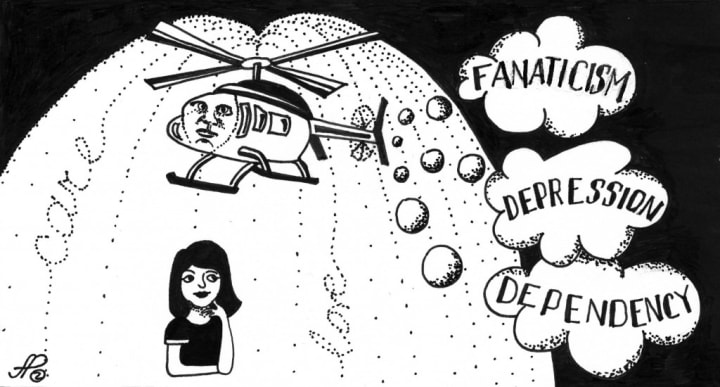The Paradox of Protections
Risk Aversion in Generations Z and Alpha

The 21st Century has developed in ways we could not imagine, especially for those of us who were coming of age at the same time as social media was becoming a bigger deal. For those of us who grew up with MySpace and Facebook, social media was nowhere near as prevalent in usage as it is now. But has this newfound prevalence led us to commit to a life of no surprises? Has it led us to fester in low-risk, highly predictable environments?
In exploring this, I watched, read, and analysed various ideas. One individual whose perspectives resonated with me was Dr Jordan Peterson. One of his ideas regarding childhood and development was that this is supposed to be a time of risk-taking and pushing boundaries, and that experiencing failure is essential to discovering success. Cue meme: "the worst person you know just made a really good point" (however misguided your ideas about Dr Peterson may be).
So, is social media entirely to blame? Or are the parents of Generations Z and Alpha becoming increasingly concerned about their overall wellbeing, making it unfeasible to let them take risks? And is risk still important to a healthy childhood, or has the meaning of childhood fundamentally changed?
As a millennial who is expected to parent Generations Z and Alpha (despite having no children myself, I am still their teacher), I have concluded that there are numerous issues contributing to this shift. No single problem is solely to blame; rather, what we have is a complex blend of factors including bubble-wrapping and overprotection through the internet, the education system, parenting practices, and even real-world experiences. Each element, while interconnected with the others, contributes its own complexities to the mix, thereby reshaping what childhood may signify today.
Nostalgia for the past serves little purpose. To Jonathan Haidt's newest book as of 2024, which has seemingly reiterated the author's talking point of two decades that childhood involves outdoor play and bike riding unsupervised by adults, I would argue that it's a quaint notion. But it overlooks the stark reality of increased gang violence and knife crime in recent years. Surely, unsupervised outdoor play would occur more frequently if these crimes were less prevalent and not exacerbated by an unaddressed poverty crisis. Criticising the ideas of this more nuanced argument through utopian nostalgia is simplistic and lacks depth.
By approaching these issues more academically, we acknowledge the multifaceted nature of the challenges at hand and avoid oversimplifying the complexities of modern childhood.
1: Social Media, Groupthink and Risk Aversion

The use of social media among Generations Z and Alpha plays a crucial role in the construction of their identities, often manifesting in cult-like adherence to particular figures or groups, and alignment with cultural ideals. This phenomenon underscores the significant impact of digital platforms on shaping adolescent self-perception within potentially detrimental online environments, a subject warranting separate analysis. Central to our current inquiry is the extent to which social media has reshaped childhood.
Beyond cultish behaviours, Generation Alpha engages with social media profiles, posts, and interactions as mediums for self-expression and identity exploration. These platforms offer a unique arena where young individuals can curate and present facets of their identities, influenced by peer interactions and digital communities. Consequently, they fulfil the need for belonging once provided by localised physical communities.
What implications does this hold for a child navigating the formative stages of socialisation? On one hand, digital connectivity facilitates global peer engagement, transcending geographical and cultural boundaries. Conversely, interactions may become curated and filtered, potentially limiting exposure to diverse viewpoints and fostering superficial relationships contingent upon likes and follows (Williams, Martinez, & Thompson, 2021). This phenomenon contributes to the emergence of "echo chambers", environments where dissenting viewpoints are seldom encountered, thereby diminishing opportunities for robust debate and critical thinking among younger generations.
In the report entitled "Growing Up Digital" (2020), a thorough exploration reveals a myriad of issues extending beyond the noted deficiency in diversity of thought due to algorithmic systems aimed at user retention in digital media. The study delves into the multifaceted impacts of prolonged screen time and digital media exposure on children's physical health. These repercussions encompass sedentary behaviours, disruptions in sleep patterns, and the heightened risk of obesity.
Furthermore, the report meticulously investigates the potential mental health ramifications, including heightened levels of anxiety, depression, and the prevalence of cyberbullying within digital environments. Beyond these considerations, the analysis scrutinises digital media's intricate role in shaping children's cognitive development. It underscores how interactive and educational digital platforms can potentially bolster cognitive skills such as problem-solving and spatial reasoning.
Nevertheless, the report also addresses noteworthy concerns regarding attention spans, the ability to multitask effectively, and the overall quality of educational content accessible online. This scholarly inquiry illuminates a nuanced landscape wherein digital media not only offers enriching educational prospects but also poses substantial challenges warranting critical scrutiny and informed intervention strategies.
While social media platforms offer Generation Alpha unprecedented opportunities for self-expression and global connectivity, they also present significant concerns. The cultivation of online identities often leads to a reliance on validation through likes and follows. This trend contributes to the formation of echo chambers, where dissenting opinions are scarce, thereby limiting the development of critical thinking skills. Thus creating a generation of those who do not take risk because of a lack of confidence in themselves as a lone human being as opposed to a part of a group with constant echo chamber validity.
2: Schooling, Treatment and Infantilising Teenagers

In her books Irreversible Damage and Bad Therapy, journalist Abigail Shrier argues that contemporary therapy workshops and ideas targeting school-aged children address minor emotional disturbances inappropriately. Shrier contends that while "all trauma is stressful, not all stress is trauma," these liberal therapists in schools are creating a crisis by treating children who are merely experiencing stress—an aspect previously considered a normal part of adolescence—as if they were undergoing trauma (Shrier, 2024).
The current generation of children appears to be less rebellious and less inclined to engage in risky behaviours compared to previous generations. Twenge (2017) attributes this trend to the prevailing perception that every minor stressor must be treated as a significant trauma. This shift in perception has led to a heightened emphasis on financial stability as the primary objective of education, which is not universally attainable for all individuals. The pervasive distribution of participation trophies, coupled with the tendency to treat everyday stresses as severe traumas, has contributed to a culture of extreme risk aversion. Consequently, students may experience significant stress when faced with the prospect of studying more challenging subjects. Thus, while the aspiration for financial stability through education is prevalent, it may not be as universally achievable as it is often portrayed.
Moreover, it is well-documented that contemporary education systems have shifted their focus from fostering growth and intellectual challenge to prioritising extreme emotional comfort (Lukianoff and Haidt, 2018). This shift has been observed by many educators, who note that students often exploit this system rather than utilising it to address genuine and serious emotional concerns. By establishing "safe spaces" and avoiding potentially triggering content, educational institutions may inadvertently reinforce the notion that students are fragile and incapable of managing stress or disagreement (Lukianoff and Haidt, 2018).
Many educators, including Tom Bennett from the Department of Education, argue that genuine intellectual and emotional development occurs when students are challenged to think critically, question their assumptions, and engage in respectful dialogue with individuals who hold differing viewpoints. They contend that educational strategies should prioritise fostering resilience by encouraging students to confront and manage discomfort rather than avoiding it. This approach is believed to equip students with essential skills necessary for navigating the complexities of adulthood and contributing effectively to a robust democratic society.
However, excessive risk aversion can lead to an expanded range of risks encompassing various domains. Consequently, any inclination towards an educational model that fosters echo chambers, even to a small degree, is increasingly recognised as potentially hazardous in the long term. How do we know this? The long term is happening now.
3: Validation Parenting and Stunted Independence

Steven Pinker contends that contemporary society represents the most peaceful era in history, attributing this trend to a heightened comprehension of human nature. According to Pinker (2011), a significant proportion of individuals refrain from criminal behavior due to an enhanced understanding of human psychology and societal norms. However, despite these assertions, a notable increase in so-called "helicopter parenting" has emerged in recent years. This phenomenon involves parents closely monitoring and controlling their children's activities, often out of concern for their safety and well-being.
The prevalence of helicopter parenting prompts consideration beyond a simple fear of crime. It suggests a deeper societal shift in attitudes towards child rearing and risk tolerance. Such behavior could stem from broader societal anxieties about children's safety in an increasingly complex and interconnected world. Moreover, it reflects evolving cultural norms and expectations regarding parental responsibilities and the perceived need to safeguard children from potential harm.
Therefore, while Pinker's argument highlights advances in understanding human behaviour as a deterrent to crime, the prevalence of helicopter parenting underscores nuanced societal concerns and dynamics influencing parental behaviours beyond mere apprehensions about criminality.
Skenazy (2009) observes that sensationalised media portrayal of infrequent yet poignant incidents affecting children, such as abductions or accidents, has the potential to distort parental perceptions of safety. This sustained exposure may exacerbate anxieties and compel parents towards excessive precautions in safeguarding their children from perceived hazards.
Skenazy (2009) further asserts that within contemporary society, there exists a pervasive pressure for children to excel academically, socially, and in extracurricular pursuits. This societal expectation often compels parents to exert stringent control over various facets of their children's lives, motivated by a desire to ensure achievement and shield them from potential setbacks or disappointments.
Additionally, Skenazy (2009) highlights the evolving legal and social frameworks which increasingly deem any level of risk to children as unacceptable. This cultural shift has precipitated the formulation of policies and regulations prioritising safety to such an extent that it restricts children's opportunities for autonomous exploration and development of independence.
Although parents may derive a sense of validation from their perceived adherence to parental norms, there are significant drawbacks that warrant consideration. These include diminished resilience, constrained independence, impaired social acumen in practical settings, and an elevated predisposition towards anxiety and apprehension in routine activities.
The exploration of contemporary parenting practices through the lenses of Steven Pinker and Lenore Skenazy reveals complex dynamics shaping parental attitudes and behaviours in modern society. Pinker’s argument about the decline in violence attributed to a deeper understanding of human nature contrasts with the observed rise of helicopter parenting, indicative of heightened anxieties and risk aversion. This juxtaposition underscores a paradox: while societal progress in understanding and managing risks has potentially reduced violent crime, it has also fostered a culture of overprotection that may hinder children’s development of resilience, independence, and social skills.
Conclusion

In addressing these multifaceted challenges, it is essential to adopt a nuanced approach that balances safety concerns with the promotion of children’s autonomy, resilience, and critical thinking skills. While technological advancements and societal changes present opportunities for positive development, they also necessitate vigilant oversight and thoughtful intervention to mitigate potential risks and maximize benefits.
Moving forward, educators, policymakers, and parents must collaborate to cultivate environments that support children in navigating and thriving amidst these complexities. This involves promoting open dialogue, fostering environments that encourage reasoned risk-taking, and equipping children with the skills needed to navigate digital spaces responsibly and critically.
Ultimately, the examination of contemporary parenting practices through the various lenses of scholars and journalists alike reveals a landscape shaped by competing tensions: between safety and risk, protection and independence, and technological progress and cultural conservatism. By acknowledging these complexities and embracing informed dialogue and action, we can strive towards fostering a generation of resilient, adaptable individuals capable of thriving in an ever-evolving global society.
Cited Sources
- Campaign for a Commercial-Free Childhood. (2020). Growing Up Digital: Media Research Symposium Report. Campaign for a Commercial-Free Childhood.
- Lukianoff, G. and Haidt, J. 2018. The Coddling of the American Mind: How Good Intentions and Bad Ideas Are Setting Up a Generation for Failure. Penguin Press, New York.
- Pinker, S. (2011). The Better Angels of Our Nature: Why Violence Has Declined. Penguin Books.
- Shrier, A. 2024. Bad Therapy. Swift Press, USA.
- Skenazy, L. (2009). Free-Range Kids: How Parents and Teachers Can Let Go and Let Grow. Jossey-Bass.
- Twenge, J.M., 2017. iGen: Why Today's Super-Connected Kids Are Growing Up Less Rebellious, More Tolerant, Less Happy--and Completely Unprepared for Adulthood--and What That Means for the Rest of Us. Atria Books, New York.
- Williams, R., Martinez, E., & Thompson, S. (2021). Digital Childhood: How Social Media Platforms Shape Socialisation and Identity Formation Among Generation Alpha. Journal of Youth Studies
About the Creator
Annie Kapur
200K+ Reads on Vocal.
Secondary English Teacher & Lecturer
🎓Literature & Writing (B.A)
🎓Film & Writing (M.A)
🎓Secondary English Education (PgDipEd) (QTS)
📍Birmingham, UK
X: @AnnieWithBooks
Enjoyed the story? Support the Creator.
Subscribe for free to receive all their stories in your feed. You could also become a paid subscriber, letting them know you appreciate their work.






Comments (1)
One of your more potent pieces! And let me add a few things: 1. I am a GenXer, and I never thought that the generation to follow would be this sensitive and scared of the world they're living in. I can blame the parents who do want to protect them from the slightest hint of discomfort, but it is still up to the individual to have their own life. 2. The teachers are doing their best, but the schools are having them do their worst. I laugh when I hear about the great teacher resignation when I realize that it is not about a lack of educators; it is simply the fact that many of them cannot teach a class of kids who think their emotions and feelings trump actually learning something. And the administration just stands there and lets a bad situation grow worse. 3. And that damn phone! Put it down and look up and around you. I see people at fireworks events filming something like that and wonder to myself, are they ever going to really look at the videos they've created? It seems truly silly now that we have more fake imagery and less real experiences. And I make a joke about it, but it is true: you cannot date someone who is in a co-dependent relationship with their smartphone. Things have to change. And I thank you for this.